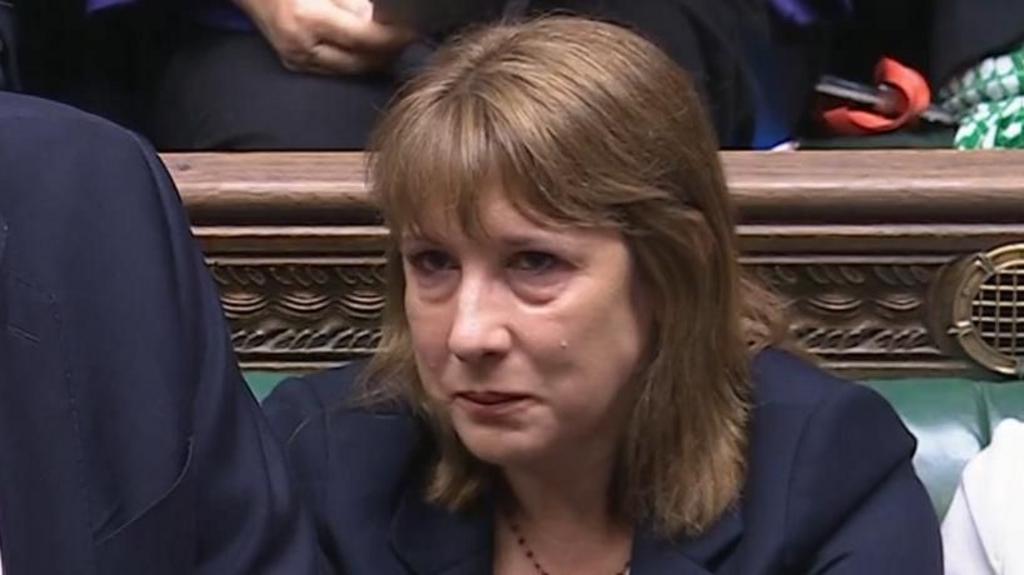“`html
Politics is an inherently vulnerable profession.
The commendable act of seeking elected office, culminating, for a select few, in the highest political positions, understandably invites intense scrutiny and challenging inquiries.
Recent events have undoubtedly amplified the scrutiny surrounding Chancellor Rachel Reeves, particularly following this week’s significant reversal of the government’s benefits system plans.
However, it’s crucial to remember that politicians are individuals, and personal matters inevitably influence their demeanor, often leaving them with limited capacity to conceal their emotions.
This reality was starkly apparent during Prime Minister’s Questions.
Observers in the House of Commons press gallery witnessed the Chancellor shedding tears.
This was not a fleeting moment, but a sustained display throughout the entire half-hour session.
As Reeves sat visibly upset beside Sir Keir Starmer, the Prime Minister remained seemingly unaware.
Following the session, an aide suggested Sir Keir check on the Chancellor’s well-being.
The Prime Minister expressed surprise, explaining his focus on answering questions had prevented him from noticing her distress.
Another cabinet minister sitting near Reeves confirmed to the BBC they were equally unaware of her distress.
“I didn’t notice anything was up,” they stated.
Only those seated opposite the Chancellor witnessed the extended period of emotional display.
“It was horrible to watch,” commented one Conservative frontbencher.
As PMQs concluded, Reeves quickly exited, accompanied by her sister Ellie, also a Labour minister.
While the Chancellor’s team attributed her emotional state to “a personal matter,” multiple cabinet ministers appeared to suggest other contributing factors.
“She had an altercation with Lindsay [Hoyle, the Speaker] just before PMQs”, claimed one senior minister.
“They had a row. I think he ended up apologising to her.”
A second minister suggested the disagreement with the Commons Speaker was the primary reason for the Chancellor’s distress.
“She’s under massive amounts of pressure,” they added. “But she has good strong women around her.”
A third minister insisted to the BBC: “She’s totally fine. I’ve just been to her office and spoken to her and she’s fine. There’s nothing to worry about.”
However, a fellow cabinet minister remarked: “I don’t think I’ve seen anything like that ever before.”
An eyewitness recounted that the Chancellor entered the chamber unusually early.
The Speaker stopped her and appeared annoyed. At one point it appeared she tried to break off the conversation to sit down on the frontbench but he kept going.
“It was clear he was overdoing it,” our eyewitness said.
About a minute later he shouted over words to the effect of “sorry”.
“That was what set her off,” our eyewitness added, and at that point she left – returning a few minutes later looking like she’d been crying.
The Speaker’s office has not commented on what happened.
On a human level, the images from Prime Minister’s Questions elicit sympathy, regardless of the contributing factors.
Conservative Leader Kemi Badenoch used the opportunity to raise questions about the Chancellor’s future, inquiries that some Labour figures are reportedly also considering privately.
Sir Keir deflected those questions in the Commons, notably refraining from explicitly affirming, as he previously had, that Reeves would remain his Chancellor until the next election.
Leaders face a dilemma in such situations: evasion risks appearing to dilute endorsement, while reaffirmation invites headlines like “Prime Minister forced to back beleaguered Chancellor.”
His team subsequently clarified their endorsement and insisted she was staying put in her job.
The Prime Minister then went further still and on camera – telling the BBC Radio 4’s Political Thinking that those thinking her tears were about the benefits U-turn are “wrong”.
Sir Keir said: “It’s wrong. That’s absolutely wrong. Nothing to do with politics. Nothing to do with what’s happened this week. It was a personal matter for her. I’m not going to intrude on her privacy by talking to you.”
Undoubtedly, a confluence of factors, varying in significance, can influence an individual’s mood, and the professional pressures on the Chancellor are considerable.
Few individuals face the constant public scrutiny endured by prominent politicians, where tough questions would have been inevitable whether Reeves attended or not.
Regardless of the specific circumstances surrounding this extraordinary moment in the Commons, a broader context exists.
For the Prime Minister and his Chancellor – the central partnership driving Labour’s resurgence and electoral prospects – re-establishing a sense of direction, confidence, and control is now paramount in the months ahead.
Failure to do so will inevitably intensify scrutiny on both of them.
Sign up for our Politics Essential newsletter to stay informed about the inner workings of Westminster and beyond.
The first minister says the UK government has “preyed” on vulnerable claimants after a dramatic Commons U-turn.
Labour has been failing its basic mission to look like a capable government. And the PM’s authority has been given a kick. But insiders have hope for the year ahead
Scotland has its own social security system – so what impact could Labour’s proposals have north of the border?
The BBC’s political editor Chris Mason and chief political correspondent Henry Zeffman on the welfare bill.
MPs approved the Universal Credit and Personal Independence Payment Bill but only after ministers made big changes.
“`

